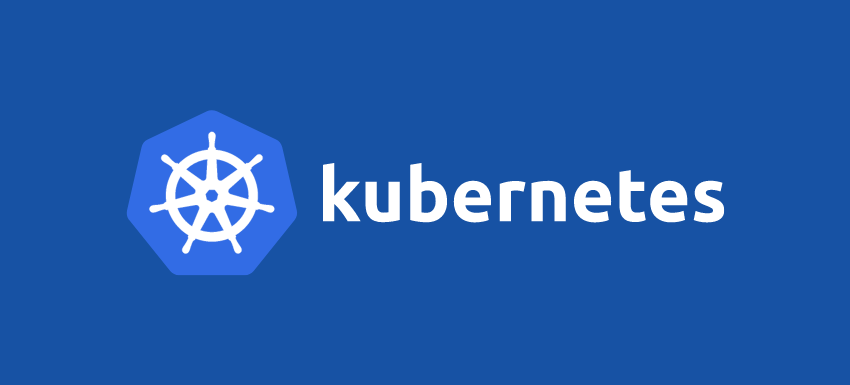The open-source platform called Kubernetes (also abbreviated as K8s) enables the deployment, scaling, and management of containerized applications regardless of location.
It was initially created at Google and released as open-source in 2014 before being donated to a foundation for cloud-native computing (cncf).
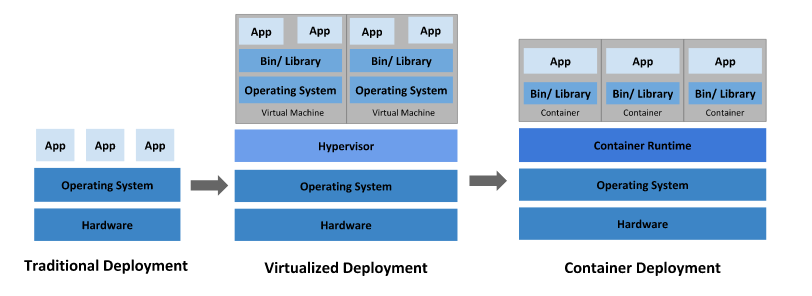
Kubernetes might be your answer if you’ve been seeking a strategy to grow your applications, deploy code more quickly, and reduce costs. This technology has completely changed how programmers create and maintain programs.
A global network of skilled programmers and coders supports the platform. The largest enterprises in the world deploy and scale applications using its container orchestration technology. Companies like Google, Twitter, Facebook, and Uber have all utilized it to create successful applications with millions of users.
Additionally, businesses like Oracle, Box, and Twilio use it as their main container platform. Kubernetes has transformed over the past few years from a minor side project to an essential component of the modern software development and IT operations landscape.
The million insights research, which indicates that the worldwide application container market size is predicted to reach USD 8.2 Billion by 2025, can be used to analyze the expansion of containerized applications.
Why is Kubernetes use expanding so quickly?
The ability to manage your apps and containers across many cloud providers, such as Amazon Web Services, Google Cloud Platform, Microsoft Azure, and IBM Bluemix, is one of the main arguments for using Kubernetes. This enables you to keep a single, consistent application architecture while scaling your application horizontally across multiple providers.
This, in turn, helps to scale your application in a faster space and save time and money by reducing the need to move your infrastructure between providers.
How do Kubernetes work?
- It offers a standard API that programmers may utilize to deploy apps everywhere.
- You can use the capabilities of a PaaS (platform as a service) with Kubernetes to deploy apps more quickly and with less effort.
- Applications can be deployed and controlled dynamically and are divided into smaller, independent parts.
How important is Kubernetes in today’s Cloud Computing landscape?
Kubernetes is an orchestration service used in today’s Cloud Computing (CC) landscape to manage containerized applications in distributed computing settings. An intriguing alternative to the conventional monolithic way of delivering apps is using a container orchestrator like Kubernetes, especially in terms of scalability.
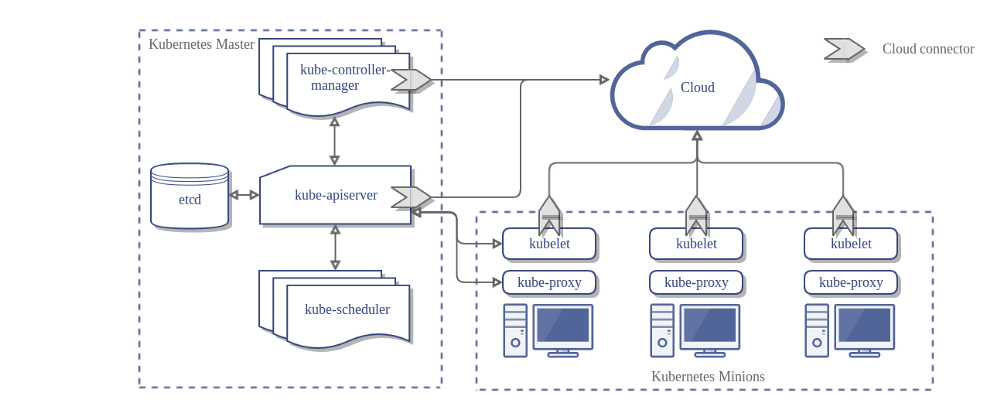
By offering a highly scalable (hundreds of thousands of containers are formed at any given moment) and secure platform on which to host containers and deploy and run applications, Kubernetes makes the process of deploying, scaling, and maintaining containerized applications simpler.
According to a report by Gartner, global container management revenue will increase significantly from a low base of $465.8 million in 2020 to reach $944 million in 2024, and a significant portion of this growth comes from public cloud container orchestration and serverless container offerings.
Below are more reasons why Kubernetes is widely adopted in cloud architecture:
- Creating container images is quicker and more efficient than utilizing VM images when delivering agile apps.
- High Availability: This is very helpful for applications like database services and web servers that need high availability.
- Creates application container images at build/release time rather than deployment time, which aids in decoupling applications.
Let’s see how IT professionals can become part of this growing, high-demand Kubernetes technology.
What does a Kubernetes certification certify?
Any certification program aims to show that a candidate has the skills and knowledge required to carry out specific activities in a career or role. The most well-known way to do this is to take a number of exams, most of which are written and tested. Certification for Kubernetes is no different.
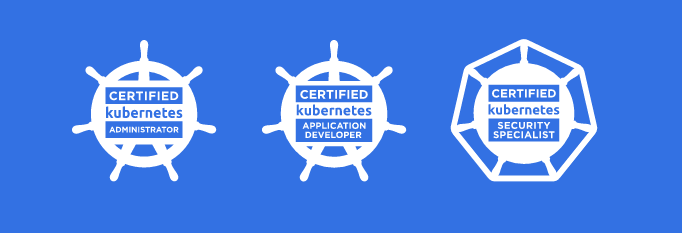
A Kubernetes certification is a demanding technical curriculum that evaluates candidates’ expertise on a selection of fundamental subjects. It is demanding since passing it is challenging and requires much effort. The exam measures your understanding of key Kubernetes concepts like deployments, stateful sets, pods, services, replication controllers, etc.
Different Kubernetes certifications
An individual can gain the necessary knowledge, skills, and abilities to manage Kubernetes settings by earning a Kubernetes certification, an industry-recognized credential for mastery of the Kubernetes technology stack.
Let’s see four important Kubernetes certifications highly regarded in the industry.
#1. Kubernetes and Cloud-Native Associate (KCNA)
The Kubernetes Certified New Associate (KCNA) exam will show a candidate’s fundamental understanding of Kubernetes and cloud-native technologies.
It includes how to deploy an application using basic kubectl commands, the architecture of Kubernetes, which includes containers, pods, nodes, and clusters, understanding the cloud-native landscape and projects like storage, networking, GitOps, and service mesh, and understanding the fundamentals of cloud-native security.
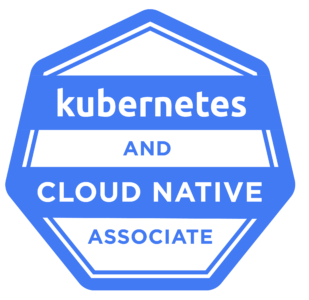
Exam particulars
- The online KCNA exam has 60 multiple-choice questions that must be solved in 90 minutes. 75 percent or more is required to pass this examination.
- The certification is valid for three years. Candidates who want to renew their certification must take the test and get a passing grade.
- The test is remotely proctored using screen-sharing, streaming audio, and video streams.
- 24 hours after the exam is over, results will be sent to the student via email.
Fees: The exam costs $250, and an additional $49 is required to complete the course.
#2. Certified Kubernetes Application Developer (CKAD)
For individuals who have mastered all facets of developing apps on Kubernetes, the Certified Kubernetes Application Developer (CKAD) certification is an industry-recognized certification that would do a valuable addition to your resume.
The exam is difficult and has a significant learning curve. Studying is the only method to fully understand a topic if you want to create the finest application possible.
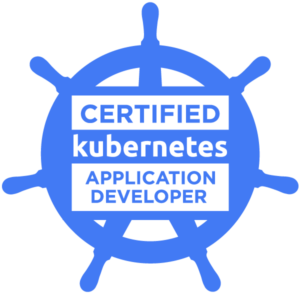
The CKAD certification program assesses your aptitude for creating, managing, and designing cutting-edge Kubernetes applications. Your understanding of the key Kubernetes ideas, elements, and APIs is tested in the examination.
Exam Particulars
- The performance-based exam is available online and consists of a set of issues that must be resolved in a command line.
- The exam contains 19 questions that need to be answered in 2 hours
- The certification validity is 3 years
Fees: The exam costs $375, and an additional $200 is required if you wish to complete the course.
#3. Certified Kubernetes Administrator (CKA)
To help you demonstrate your ability to successfully manage a Kubernetes system in a safe, responsible, and secure manner, the CKA certification is a thorough test with 360-degree assessments.
The Certified Kubernetes Administrator (CKA) credential is intended to show that the holder has advanced knowledge and expertise in managing containerized applications on the Kubernetes platform, locally or in the cloud.

Additionally, the certification displays an understanding of the Kubernetes architecture, best practices, and how to use the platform to achieve organizational objectives. It exhibits the capacity to plan and oversee distributed applications on Kubernetes as well as diagnose and fix complicated Kubernetes situations.
Exam Particulars
- In order to pass this performance-based, online exam, you must complete a number of activities from a command line running Kubernetes.
- Candidates have two hours to finish the 17 questions, and a score of 66 percent or above is required to pass.
- The certification is good for three years.
Fees: The exam costs $375, and an additional $200 is required if you wish to complete the course.
#4. Certified Kubernetes Security Specialist (CKS)
The Certified Kubernetes Security Specialist (CKS) certification is made to demonstrate knowledge of the top Kubernetes deployment security procedures. A significant step toward becoming a Kubernetes Security Specialist is passing the exam.

For specialists in Kubernetes security, the CKS certification is the top designation available in the market. It reveals a thorough understanding of the most significant security flaws in Kubernetes. It offers the capability to operate and manage clusters securely on the cloud, bare metal, and public clouds.
You can advance your career in the security and governance of containerized applications operating on Kubernetes, the leading container orchestration technology, with the CKS certification.
The exam covers subjects including safe programming, auditing, vulnerability management, security best practices, and common vulnerabilities in containerized applications operating in Kubernetes.
Exam Particulars
- The prerequisite for the CKS exam is that candidates should have passed the Kubernetes Administrator (CKA) exam.
- 15 questions must be answered in the two hours allotted for the exam.
- The validity of certification is 2 years.
Fees: The exam costs $375, and an additional $200 is required if you wish to take the course.
Please note: The exam costs of all the above four courses are the latest while writing this post. Please visit training.linuxfoundation.org for more details. The above exam logos credit goes to training.linuxfoundation.org
Job prospects and career progression of Kubernetes certification holders
Organizations of various sizes utilize Kubernetes, one of the most well-liked container orchestration solutions, to manage their container infrastructure. The Kubernetes certification is currently one of the most sought-after IT credentials, and many employers are hiring candidates who have it on their CV.
Many Kubernetes certified professionals go on to work for well-known companies like Google and Amazon, where they can develop their careers and gain important expertise. Being certified in Kubernetes can lead to a variety of job options, including those in development, operations, security, consulting, support, and many more.
The entire IT infrastructure revolves around the cloud. According to a survey from Globe News Wire, the market for cloud computing (CC) is anticipated to reach USD 791.48 billion in 2028, growing at a CAGR of 17.9% from 2022 to 2028. Kubernetes’ widespread acceptance can be attributed to cloud service providers choosing it over other options.
XaaS, IaaS, PaaS, SaaS, etc., are just a few of the cloud-based services that require Kubernetes-certified professionals for administration, management, design, and development. Therefore, Kubernetes developers, Kubernetes administrators, and Kubernetes security professionals are essential wherever there are Containers, Kubernetes, and the Cloud.
How to prepare for the Kubernetes Certification Exams?
#1. Kubernetes and Cloud-Native Associate (KCNA) Practice Tests
Candidates can use these Udemy practice exams to prepare for the KCNA exam. For developers wishing to join the Kubernetes cloud-native ecosystem, it offers an entry-level certification in cloud-native technology.
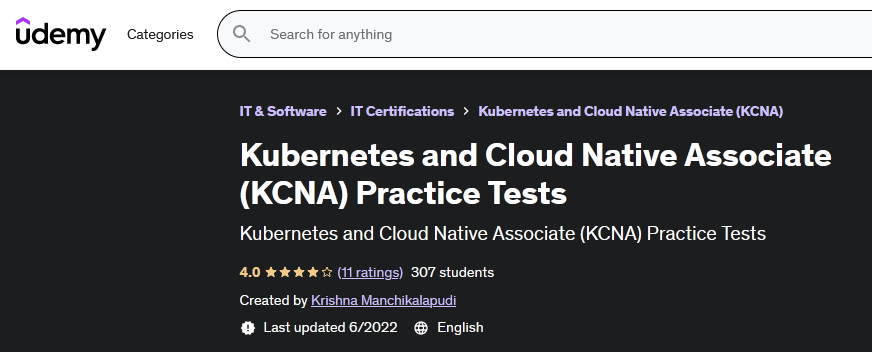
The Kubernetes Fundamentals, Container Orchestration, Cloud Native Architecture, Cloud Native Observability, and Cloud-Native Application Delivery subjects are covered in the practice exam. You will be able to fully comprehend each topic by using these practice questions and answers with explanations, which will help you pass the KCNA exam.
#2. Certified Kubernetes Administrator (CKA) with Practice Tests
This Udemy practice exam for the CKA includes 109 articles and 19 hours of video focusing on topics such as how to design a Kubernetes cluster, troubleshoot a Kubernetes cluster, configure storage on a Kubernetes cluster, test a Kubernetes cluster end-to-end, and more.
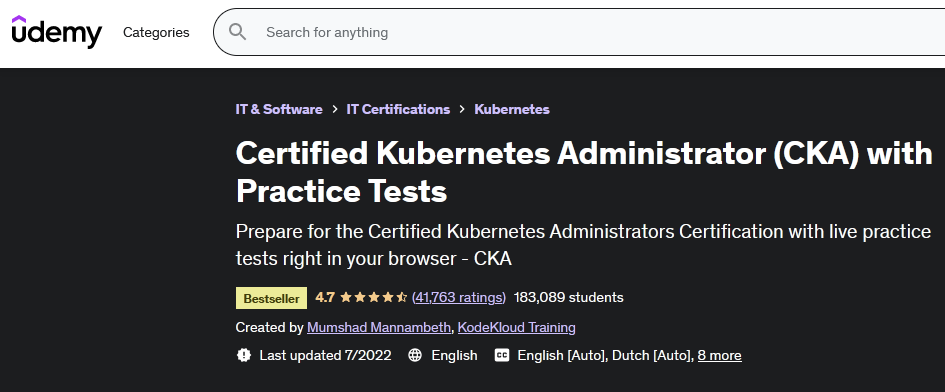
System administrators, DevOps specialists, and application developers are the target audience for this course. The course includes the practical lab experience needed to pass the CKA exam.
#3. Certified Kubernetes Security Specialist (CKS)
This Udemy Kubernetes Complete course prepares students for both the theory and practical portions of the CKS exam. The course provides comprehensive CKS preparation, including in-depth technical knowledge of Kubernetes and ideas related to security.
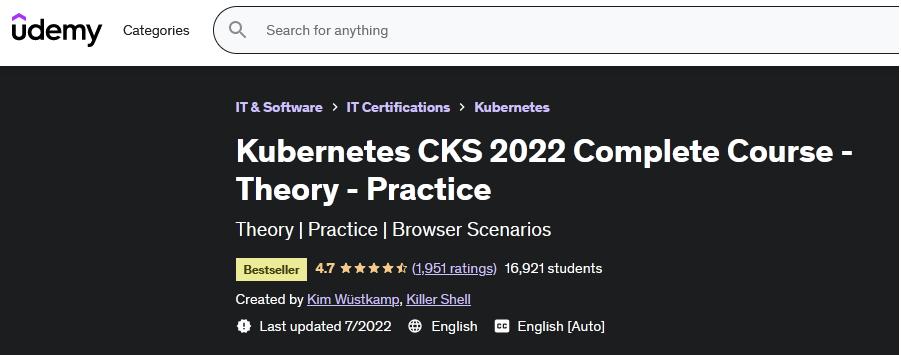
There are 43 articles and 11 hours of video in the course. The course walks through practical hands-on challenges and helps set up a CKS cluster.
#4. Certified Kubernetes Application Developer (CKAD)
Designing, developing, configuring, and exposing cloud-native applications for Kubernetes are covered in this Whizlabs course. 37 lectures totaling more than five hours are included in the course, which supports SMEs (subject matter experts) assistance as and when required.
The videos covering the course’s key principles, pod design, configuration, observability, networking, etc., are available.
#5. Certified Kubernetes Administrator (CKA)
The Whizlabs course teaches the essential skills needed to be a Kubernetes administrator, such as cluster architecture, installation and configuration, services and networking, troubleshooting, workload planning and scheduling, cluster management, storage, and more.
There are 59 full-length video lectures that make up the whole course. Application developers, architects, site reliability engineers (SREs), and software developers are good candidates for the training.
#6. Certified Kubernetes Security Specialist (CKS)
A thorough video course on Kubernetes security-related concepts may be found in this Whizlabs “Certified Kubernetes Security Specialist” course. It is laid out according to the Certified Kubernetes Security Specialist (CKS) Exam syllabus in escalating order of complexity.
The training covers supply chain security, cluster setup and hardening, minimizing microservice vulnerabilities, run-time security, etc. The course is delivered through 43 video lectures.
#7. Container Orchestration using Kubernetes
This Simplilearn course material for Container Orchestration with Kubernetes has been carefully crafted to deliver the essential abilities and information required to carry out practical work as a Kubernetes administrator.
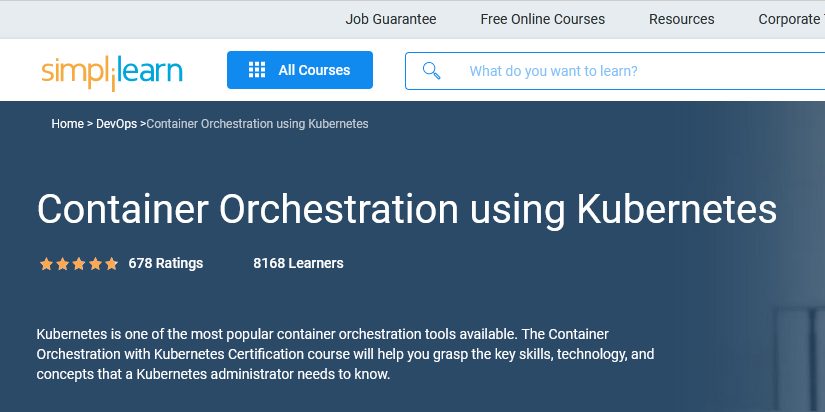
The Kubernetes cluster administrators, software developers, system administrators, Linux administrators, and cloud administrators are the target audience for this Container Orchestration with Kubernetes course.
Application lifecycle management, configuration and validation, networking, scheduling, security, cluster maintenance, and much more are covered in this training course. Self-study courses, online classes, and corporate training are all options for the training.
#8. Edureka’s Kubernetes certification training
Top industry professionals have curated Edureka’s Kubernetes certification training. You may pass the Certified Kubernetes Administrator (CKA) Exam on your first attempt with the help of this Kubernetes training. The course is interactive to learn how to install Kubernetes, set up networking between pods, and protect the cluster from outside intrusion.
With live, instructor-led instruction and practical examples, this online Kubernetes training prepares you to pass Edureka’s certification exam and become a certified Kubernetes specialist.
#9. Exam Tips: Certified Kubernetes Administrator (CKA)
The CKA course is offered through the LinkedIn platform. It is the most prestigious certification available for DevOps engineers and IT specialists who create and maintain cloud-native Kubernetes applications.
The advantages of CKA certification and the subjects covered in each of the ten domains of the exam are covered in this course. In order to help you do better on this proctored, performance-based exam, the instructor also offers study advice.
#10. Exam Tips: Certified Kubernetes Application Developer (CKAD)
The CKAD exam’s content on the LinkedIn platform was chosen to cover relevant topics developers who want to deploy, maintain, and watch over an application in a Kubernetes environment should be aware of.
The course also offers a high-level review of the ideas covered on the exam, offers study advice, and describes how CKAD certification might further your career.
Conclusion
The usage of Kubernetes is growing exponentially, and certification is the best method to prove your worth in today’s competitive employment market. The Kubernetes specifics and certification mentioned above would unquestionably benefit your career progression.
Si quiere puede hacernos una donación por el trabajo que hacemos, lo apreciaremos mucho.
Direcciones de Billetera:
- BTC: 14xsuQRtT3Abek4zgDWZxJXs9VRdwxyPUS
- USDT: TQmV9FyrcpeaZMro3M1yeEHnNjv7xKZDNe
- BNB: 0x2fdb9034507b6d505d351a6f59d877040d0edb0f
- DOGE: D5SZesmFQGYVkE5trYYLF8hNPBgXgYcmrx
También puede seguirnos en nuestras Redes sociales para mantenerse al tanto de los últimos post de la web:
- Telegram
Disclaimer: En Cryptoshitcompra.com no nos hacemos responsables de ninguna inversión de ningún visitante, nosotros simplemente damos información sobre Tokens, juegos NFT y criptomonedas, no recomendamos inversiones

